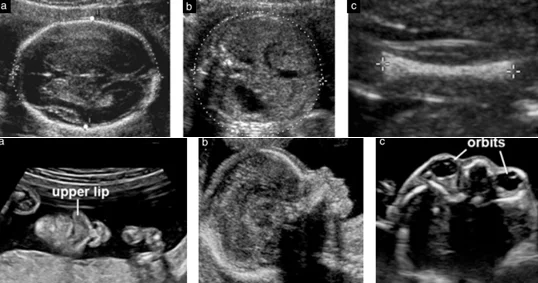Anomaly Scan in Chennai – Detailed Level 2 Pregnancy Scan
Highly Accurate Anomaly Scans (18–22 Weeks) Performed by Fetal Medicine Specialist Dr. Deepthi Jammi






Anomaly Scan (18–20 Weeks)
The Anomaly Scan, or the 20-Week Scan, is one of the crucial prenatal scans during pregnancy.
At Jammi Scans, Dr. Deepthi Jammi, Fetal medicine specialist in Chennai performs your anomaly scan and provides accurate results with her expertise in fetal medicine.
Know more Fetus in the 5th month of pregnancy on an ultrasound scan.
Fetus in the 5th month of pregnancy on an ultrasound scan.
Accurate Anomaly Scan in Chennai
The Anomaly Scan is a mid-pregnancy ultrasound scan that evaluates the baby's internal structures, such as limbs, spine, brain, heart, and major organs to detect any structural abnormalities.
 Key ultrasound views analysed during an anomaly scan.
Key ultrasound views analysed during an anomaly scan.
When Should You Do the Anomaly Scan?
The Anomaly Scan is ideally done between 18–22 weeks of pregnancy. This time window allows the best visibility of your baby's organs and structures, enabling doctors to accurately assess development and identify any potential risk of birth defects or abnormalities.
Why Timing Matters?
18–22 weeks is the right time frame for an anomaly scan because, after 22–24 weeks, visibility decreases due to:
- Reduced space in the uterus
- Baby's position
- Increased calcification of fetal bones
Taking the scan earlier than 18 weeks may not give comprehensive clarity into the baby's structures.
Anomaly Scan @ Jammi Scans
See what our comprehensive anomaly scan reports look like. Detailed, accurate, and delivered immediately.
How Is the Scan Performed?
Ideally, an anomaly scan uses a transabdominal ultrasound procedure. It is a safe, painless, and non-invasive process.
A thin layer of lubricant gel is applied to the abdomen
The probe (transducer) glides gently over the skin
Real-time images of the fetus are displayed on the monitor
Dr. Deepthi Jammi closely monitors structures for abnormalities
Some parents opt for a 3D anomaly scan to see the baby's facial features more clearly.
How to Prepare?

Comfortable Clothing
Wear comfortable clothing.

Full Bladder
Moderately fill your bladder before the scan to improve visibility of the uterus.

No Fasting Required
No special preparation is required before an anomaly scan. You can eat and drink water as usual. There are no dietary restrictions.
9 Abnormalities Revealed in an Anomaly Scan
Anomaly Scan or TIFFA Scan assesses a wide range of the baby's structures including
-
Brain (1/9)
Abnormalities in the head/skull
-
Spine (2/9)
Alignment and closure of the spinal cord
-
Face (3/9)
Skull and profile shape, nose and nasal bone, upper lip (for cleft), mouth and jaw alignment, and overall facial symmetry
-
Heart (4/9)
Checks the baby's heart for the four chambers, valves, etc.
-
Abdominal Wall or Diaphragm (5/9)
Ensures abdominal organs are enclosed properly
-
Stomach (6/9)
Presence and normal appearance of the stomach and intestines
-
Kidneys (7/9)
Presence of both kidneys and any abnormalities
-
Bones (8/9)
Structuring of the arms, legs, hands, and feet
-
Limbs (9/9)
Confirms if both arms and legs are present and well-formed
Apart from assessing the baby’s structural organs, the anomaly scan also checks

Amniotic Fluid
Measuring fluid levels to ensure the baby has enough cushion and space to move.

Placenta
Checking position, maturity, and blood flow to ensure proper nutrient delivery.

Umbilical Cord
Verifying the presence of 3 vessels (2 arteries, 1 vein) for healthy circulation.

Fetal Biometry & Estimated Weight
We measure key growth parameters including BPD, HC, AC, FL to evaluate growth rate, body proportions, development, and estimated weight.
FAQs
Quick answers to your most common questions.
Yes. The anomaly scan uses sound waves and not radiation. Hence, it is completely safe for both the mother and the baby.
If any abnormality is detected, our fetal-medicine expert Dr. Deepthi Jammi will clearly explain the findings and guide you through the next steps, which may include:
- Follow-up targeted scans
- Fetal echocardiography
- Genetic counseling
- Specialist referrals (if required)
A normal anomaly scan significantly reduces the risk of major structural abnormalities. However, it cannot rule out all conditions, especially functional or genetic disorders.
No. The anomaly scan is done transabdominally and is not painful. You may feel mild pressure, but any discomfort is usually minimal.
No special preparation is required. You can eat normally and drink water as usual. There are no dietary restrictions before an anomaly scan.
Yes. An anomaly scan is also known as a Level 2 scan or TIFFA scan.
An anomaly scan can identify certain physical markers that may indicate a higher risk of Down syndrome or other genetic conditions. However, it cannot confirm these conditions.
Confirmatory tests such as NIPT, CVS, or amniocentesis may be recommended if required.
Although the baby’s gender can be visualized during the scan, disclosure of fetal sex is strictly prohibited in India under the PC & PNDT Act.
At Jammi Scans, anomaly scan reports are provided within a few minutes after completing the ultrasound.
Yes. At Jammi Scans, husbands and family members are allowed inside the scan room to witness the emotional moment of seeing your baby.
Why the Anomaly Scan Is Important for Prenatal Care?
An anomaly scan helps with:
Timely medical intervention for anomalies
Early detection allows doctors to plan appropriate treatment and care strategies.
Planning for specialised care, birth plan, and NICU support
Helps prepare for any special medical needs the baby might require after birth.
Monitoring pregnancies more closely
Enables healthcare providers to track fetal development and provide personalized care.
At Jammi Scans, Dr. Deepthi Jammi provides personal counselling after each scan and guides patients through the next steps.
Limitations of the Anomaly Scan
While the anomaly scan is highly informative, it has certain limitations that parents should understand. No ultrasound can detect all abnormalities.
Cause of Malformation Cannot Be Identified
Though the anomaly scan detects the abnormalities, your doctor cannot identify the reason behind malformation. In such cases, either a repeat test or genital counseling is recommended.
Abnormalities That Develop Later in Pregnancy
Certain abnormalities like major cardiac issues, bowel obstructions, congenital diaphragmatic, hernia, hydrocephalus, microcephaly, club foot, kidney or intestinal obstruction may evolve during the later phase of pregnancy. The evolving variations cannot be diagnosed in an anomaly scan. Your fetal expert may recommend a repeat scan between 24 and 25 weeks of gestation in such situations.
Findings That Need Further Evaluation
Some findings may not be anomalies but require scan follow-ups, biochemical testing or invasive testing. Some findings may be transient and may change with time.
Specialised Heart & Brain Studies Required
Specialized Fetal Echo (heart study) or extended neurosonography (brain study) will be done if the referred doctor prescribes the same. Even if the brain may look normal on ultrasound examination, its function cannot be evaluated.
Anomalies Difficult to Recognize on Ultrasound
Some anomalies like soft tissue fusion of fingers/toes, absence of anal opening or absence of auditory opening may not be recognizable by ultrasonography.
Deep Cleft Lip Detection Challenges
Cleft lip found deep inside the mouth is a very challenging factor to be diagnosed with an ultrasound scan.
Maternal & Fetal Physical Factors
Other factors such as the patient’s build, scars from a previous operation and the way the baby is positioned may limit the diagnostic ability of this test.
Factors That Reduce Scan Visibility
Several factors like gestational age at which scan is done, the fetal position at the time of the scan, maternal body habitus, liquor volume, and shadows from fetal parts may restrict/limit the visibility of this scan.
Limitations in Detecting Chromosomal Issues
Ultrasound markers have only 50 to 70% capability to diagnose chromosomal anomalies. Consequently, invasive procedures for identifying Down's syndrome may be the best option. Your fetal expert can advise you on these procedures.
Challenges in Multiple Gestation Scans
Multiple gestations (twin/triplet pregnancies etc.) may cause difficulties in ultrasound examination due to fetal position and overlap.
Heart Anomalies That May Still Be Missed
Even specialized fetal echocardiography (heart study) cannot pick certain cardiac anomalies such as Secundum ASD, small VSD, PDA, etc. A heart hole lesser than 5mm is also hard to diagnose in an anomaly scan.
Obesity Limiting Scan Accuracy
Obesity is a special challenge for ultrasonography. The fat in the mother’s abdominal wall absorbs the ultrasound energy, thus degrading the images and making the diagnosis very difficult.
3D/4D Scans Are Not Routine
3D/4D ultrasound is used only to assess certain abnormalities and is not a routine.
Legal Restrictions on Genital Organ Study
The study of the genital organs is prohibited under the PC & PNDT Act. Hence detection of abnormalities of genital organs is not feasible.
Important: Despite these limitations, the Anomaly scan remains one of the most valuable tools in prenatal assessment. At Jammi Scans, Dr. Deepthi Jammi uses advanced ultrasound technology and specialised expertise to provide the most accurate evaluation possible.
Why Choose Jammi Scans for Pregnancy Ultrasound?
Specialized care, advanced technology, and compassionate expertise — all focused on your pregnancy journey.

Jammi Scans
At Jammi Scans, all scans are performed by Dr. Deepthi Jammi, an expert Fetal Medicine Specialist, ensuring high standards of accuracy and care for anomaly scans in Chennai.

Reports with in 15 mins
Accurate reports delivered the same day, with clear explanations to help parents understand every detail confidently.

Dr. Deepthi Jammi
Dr. Deepthi Jammi is an FMF-certified fetal medicine specialist (Fetal Medicine Foundation), and she ensures every single FMF protocol is followed to provide accurate results.

Accredited & Certified
Jammi Scans is NABCB-accredited and ISO 9001:2015 certified, meaning we follow the highest standards, undergo regular audits, and ensure that every scan is done precisely.

Pregnancy Ultrasound
Jammi Scans is dedicated exclusively to pregnancy ultrasound and fetal medicine.

Latest Technology
Jammi Scans employs the latest technology ultrasound machines such as the GE Voluson Expert 22 and combines it with Dr. Deepthi Jammi's expertise in fetal medicine to provide comprehensive results.
Pregnancy Ultrasound Scans We Offer
Comprehensive fetal screening at every stage — from confirmation to final growth assessment.
An early pregnancy scan is the first ultrasound scan done to confirm pregnancy. Check the viability of the baby.
- Check the viability of the baby
- Check the baby’s position
- Count the number of babies
- Check the presence of fetal heart rate
- Estimate the baby’s due date
First-trimester screening for chromosomal abnormalities using nuchal translucency (NT) and nasal bone (NB) assessment.
- Down syndrome risk screening
- Fetal nasal bone presence
- Nuchal translucency thickness
- Ductus venosus & tricuspid flow
A detailed anatomy scan is a comprehensive scan used to evaluate fetal development and detect structural anomalies.
- Brain, face, spine & limbs
- Heart (4-chamber view)
- Stomach, kidneys, bladder
- Placenta position & cord
A growth scan is a third-trimester ultrasound that monitors the baby’s growth and development.
- Estimated fetal weight (EFW)
- Amniotic Fluid Index (AFI)
- Fetal position & movements
- Placental maturity
A fetal Doppler scan is used to assess blood flow between the mother, placenta, and baby.
- Umbilical artery PI/RI
- MCA Doppler for anemia risk
- Uterine artery notching
- Combined with Growth Scan
What Our Patients Say
Real reviews from mothers who trusted us with their pregnancy journey.
"Dr. Deepthi is so professional and does the scan clearly. The entire team out there are friendly and the center is maintained clean and neat. The process defines to get the scan done is also easy. Highly recommended for pregnancy scans"
"All the attenders and sisters are very kind. Well responsive. Patient in clarifying questions. Dr. Deepti ma’am is a positive vibe. She takes good time with each pregnant women and explain everything in detail."
"Best place for scan .. clear and accurate scan.. clean environment and good service.. Dr. Deepthi madam, was so kind in explaining the scanning process and fetal growth .. Her communication to patient was so good, clear and precise. One must visit this place. Highly recommended."
Jammi Scans – Pregnancy Ultrasound Centre, T. Nagar, Chennai
Trusted by 50,000+ mothers for accurate, compassionate, and timely pregnancy scans.

Dr. Deepthi Jammi
MBBS., M.S. (OBGYN)
Post-Doctoral Fellowship in Fetal Medicine
Advanced Fellowship in Obstetric Ultrasound
Judged the best outgoing student in her class, Dr. Deepthi Jammi maintains an intense focus on the latest developments in fetal medicine to provide maximum value to her patients. She is an expert at performing specialized scans to ensure optimal fetal development, providing individual attention and personal counseling to every couple.














